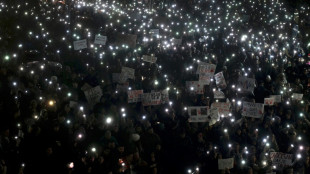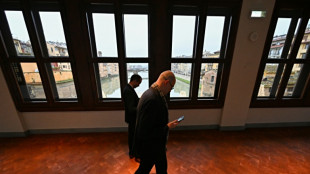
-
 Court rules against El Salvador in controversial abortion case
Court rules against El Salvador in controversial abortion case
-
Reggaeton star Daddy Yankee, wife resolve business dispute

-
 French court hands down heavy sentences in teacher beheading trial
French court hands down heavy sentences in teacher beheading trial
-
Israel army says troops shot Syrian protester in leg

-
 Tien sets-up all-American NextGen semi-final duel
Tien sets-up all-American NextGen semi-final duel
-
Bulked-up Fury promises 'war' in Usyk rematch

-
 Major reshuffle as Trudeau faces party pressure, Trump taunts
Major reshuffle as Trudeau faces party pressure, Trump taunts
-
Reggaeton star Daddy Yankee in court, says wife embezzled $100 mn

-
 Injured Eze out of Palace's clash with Arsenal
Injured Eze out of Palace's clash with Arsenal
-
Norway's Deila named coach of MLS Atlanta United

-
 In Damascus meeting, US drops reward for arrest of Syria's new leader
In Damascus meeting, US drops reward for arrest of Syria's new leader
-
Inter-American Court rules Colombia drilling violated native rights

-
 Amazon expects no disruptions as US strike goes into 2nd day
Amazon expects no disruptions as US strike goes into 2nd day
-
Man Utd 'more in control' under Amorim says Iraola

-
 Emery insists Guardiola 'still the best' despite Man City slump
Emery insists Guardiola 'still the best' despite Man City slump
-
US confirms billions in chips funds to Samsung, Texas Instruments

-
 English Rugby Football Union chairman quits amid pay row
English Rugby Football Union chairman quits amid pay row
-
Wall Street rebounds despite US inflation ticking higher

-
 Major reshuffle as Trudeau faces party pressure, Trump attacks
Major reshuffle as Trudeau faces party pressure, Trump attacks
-
Serbia schools to shut amid new protests over station collapse

-
 Serbia schools shut amid new protests over station collapse
Serbia schools shut amid new protests over station collapse
-
Gatland remains as Wales boss but must 'change fortunes on the pitch'

-
 Argentina's dollar craze cools under greenback-loving Milei
Argentina's dollar craze cools under greenback-loving Milei
-
Medici secret passageway in Florence reopens after refit

-
 Anger after Musk backs German far right
Anger after Musk backs German far right
-
Arteta says 'best is yet to come' as he marks five years at Arsenal

-
 Pereira happy to achieve Premier League 'target' with Wolves
Pereira happy to achieve Premier League 'target' with Wolves
-
'Dark lull' in German energy transition sparks political debate

-
 Russian skaters allowed to compete as neutrals in 2026 Winter Olympics
Russian skaters allowed to compete as neutrals in 2026 Winter Olympics
-
Russian missile barrage on Kyiv kills one, damages embassies

-
 No longer Assad's mouthpiece, Syrian media face uncertainty
No longer Assad's mouthpiece, Syrian media face uncertainty
-
US diplomats meet with Syria's new ruler

-
 EU, Swiss hail 'historic' new deal resetting relations
EU, Swiss hail 'historic' new deal resetting relations
-
Stocks retreat as US inflation ticks higher

-
 Two dead after Lapland tourist bus crash in Finland
Two dead after Lapland tourist bus crash in Finland
-
Fed's favored inflation gauge edges higher in November

-
 Ex-IMF chief Rato gets four-year jail term in Spain for tax crimes
Ex-IMF chief Rato gets four-year jail term in Spain for tax crimes
-
Spain orders 25 more Eurofighter jets from Airbus

-
 Anti-whaling campaigner Paul Watson arrives in France
Anti-whaling campaigner Paul Watson arrives in France
-
Fed's favored inflation gauge rises again in November

-
 Spurs boss Postecoglou blasts 'offensive' personal criticism
Spurs boss Postecoglou blasts 'offensive' personal criticism
-
Seven-year-old dies in stabbing attack at Croatia school

-
 'Life is short': Vonn makes comeback in St Moritz
'Life is short': Vonn makes comeback in St Moritz
-
Man Utd's Mount out for 'several weeks' as injury woes return

-
 Chilwell likely to be first to ask to leave Chelsea, says Maresca
Chilwell likely to be first to ask to leave Chelsea, says Maresca
-
US hours from government shutdown over Christmas

-
 French PM rushes to name new government by Christmas
French PM rushes to name new government by Christmas
-
Russian missile barrage on Kyiv kills one, damages diplomatic missions

-
 Dias ruled out for up to four weeks as Man City suffer fresh blow
Dias ruled out for up to four weeks as Man City suffer fresh blow
-
Italy's Casse claims first World Cup win in Val Gardena super-G


No longer Assad's mouthpiece, Syrian media face uncertainty
Syrian media outlets which trumpeted the glories of Bashar al-Assad's oppressive rule quickly adopted revolutionary fervour after his ouster, but uncertainty shadows the sector.
For decades, Syria's ruling Baath party and the Assad family dynasty heavily curtailed all aspects of daily life, including freedom of the press and expression.
The media became a tool of those in power.
When a rebel alliance led by Islamist group Hayat Tahrir al-Sham (HTS) took Damascus on December 8, announcing Assad's overthrow after an 11-day offensive, confusion reigned and state news agency SANA, the government mouthpiece, went silent for more than 24 hours.
State television broadcast old programmes instead of the fast-evolving events. Then a group of men in the news studio read a statement from the "Damascus Conquest operations room". They announced "the liberation of the city of Damascus and the fall of the tyrant Bashar al-Assad".
Those words would have been unimaginable two weeks earlier.
For hours, the channel then broadcast a full-screen message on a red background announcing the "victory of the great Syrian revolution".
Foreign media -- whose entry to the country was heavily restricted under Assad -- flooded in as soon as he was toppled, rushing to notorious prisons and other sites that were out of reach under his paranoid rule.
- 'Not guilty' -
After Syria's war erupted in 2011 with the government's brutal repression of pro-democracy protests, Assad tightened restrictions on independent journalism. He expected adherence to the government narrative.
Few reports of the fast-moving rebel offensive initially appeared on official media, and no military comment was allowed except from the army as rebels swept up government-held territory.
Upon Assad's ouster, journalists -- particularly in state media -- quickly changed their online profile photos to pro-revolutionary images and removed anything demonstrating their involvement with the former authorities.
SANA the following day changed its cover picture on messaging app Telegram to match the three-star flag symbolic of Syria's uprising. The agency began publishing news including announcements from the rebels' military operations room.
Private pro-government publication Al-Watan -- relatively critical compared to other outlets -- on the day the rebels took Damascus published a statement defending itself.
"Syrian media and media workers are not guilty," it said.
Like other outlets, the daily was "only carrying out instructions and publishing the news (the government) sent us. Quickly it became clear it was false", wrote editor-in-chief Waddah Abd Rabbo.
Al-Watan, established in 2006, has since published news from the new administration, and Abd Rabbo said officials from the information ministry "told us our team could continue working".
"We hope in future that we can return to print, particularly because Syria is the only country that doesn't print a single newspaper," he told AFP by telephone.
All Syrian newspapers halted print publication during the Covid-19 pandemic.
- 'Unknown future' -
Some other local media platforms have been gradually returning to work or relaunching, including private television channel Sama, which was funded by Syrian businessman and lawmaker Mohammed Hamsho.
One employee, requesting anonymity due to security concerns, said civilian members of HTS -- accompanied by armed rebels -- entered the station and told employees to return.
Other outlets have not, including private radio station Sham FM, which initially said it was suspending news and information programming "until the general situation becomes stable".
Two days later the station, which launched in Damascus in 2007, announced it was ceasing production "following a decision from the Ministry of Information in the transitional government."
"I have around 70 employees" who in turn have families, said founder and general manager Samer Youssef, adding that "thousands of people worked in the media" under Assad.
"An unknown future awaits us and all media who worked under the control of the old regime," he told AFP.
Reporters Without Borders, a freedom of information watchdog, ranked Syria second-last on its World Press Freedom Index this year, ahead of Eritrea, and behind Afghanistan.
The new administration in Syria has not necessarily reassured the media.
On December 13, the Information Ministry released a statement saying "media workers who were part of the war and propaganda machine of the fallen Assad regime, and contributed directly or indirectly to promoting its crimes," would be "held to account".
Bassam Safar, head of the Damascus branch of the anti-Assad Syrian journalists' union, which was previously based abroad, said no media worker can be held to account "unless it is proven that they took part in the bloodshed."
That, he said, "is the business of the courts."
For him, the Syrian people should reconcile with their journalists, to establish "a new media environment built on freedom" and human rights.
R.Lee--AT
